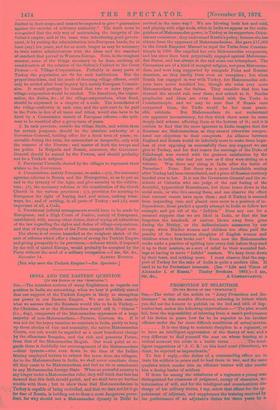PROMOTION BY SELECTION.
[TO THE EDITOR OF THE "SPECTATOR."]
Sin,—The writer of the article on "Army Promotion and Re- tirement" in this month's Blackwood, referring to letters which you did me the honour to publish on the 2nd and 16th of Sep- tember last, makes the following observations :—"The plan would fail, from the impossibility of inferring from a man's performance of his duties in peace how far he be superior to his brother officers under the far more difficult conditions of actual service.
It is one thing to maintain discipline in a regiment, or to have an intelligent appreciation of the theory of war, and a very different to find yourself the man on whose bearing at a
critical moment the crisis in a battle turns The intel- ligent suggestions of 'A. C. R.' on this head must (therefore), we think, be rejected as impracticable."
To this I reply,—the duties of a commanding officer are to train his soldiers in peace and to lead them in war, and the same qualities which render him an efficient trainer will also render him a daring lender of soldiers.
1.f there be among the subalterns of a regiment a young man distinguished for clearness of judgment, energy of character, de- termination of will, and for the intelligent and conscientious dis- charge of his military duties, I say, select that officer for the ap- pointment of adjutant, and supplement the training received by the performance of an adjutant's duties for three years by a
course of instruction at a military college. Do this, and by means of this process of selection and special training, you are certain to obtain officers far better fitted for the efficient com- mand of a regiment, both in peace and war, than if you promote officers to the command merely on account of their seniority in a roster, either general or regimental, from which you have, let it be granted, succeeded in weeding-out all officers who can fairly be considered absolutely incapable of being entrusted with the command of a regiment.
Does the writer in Blackwood give any reasons to show that this opinion is incorrect? Does he even meet it by a direct and specific contradiction ? Certainly not. He says, indeed, "All devices for selecting officers in peace-time, whether by educa- tional or other tests, will certainly come short of attaining the desired object."
He also says, "The evidence taken by the Commissioners is unanimous on this point." But the specific suggestion of selecting commanding officers from old adjutants was not made by any witness who gave evidence before the Commissioners. It was therefore never considered by them, and it cannot be fairly included among the various tests other than educational which they are stated to have unanimously condemned.
Indirectly bearing on the point, I can quote opinions which tend to show that had this suggestion been made and discussed, it is by no means improbable that the report concerning it might have been favourable. Lord Strathnairn says :—" There is nothing so good as a qualification for a commanding officer as a good adjutant. (vide Q. 3,318). The late Lord Sandhurst says :—" The mere fact of being adjutant qualifies an officer for the position of Adjutant-General probably more than the Staff College." I trust, Sir, that you will do me the favour to publish this letter, so that the attention of the writer of the article in Blackwood may be drawn to what I consider a defect, which quite destroys the force of the observations he has made in condemna- tion of the plan of selection suggested in my letters. It gave me much pleasure to see that a writer whose opinions regarding the appointment and promotion of officers in many respects agree with my own, should have been allowed an opportunity of so very ably advocating those opinions in such an influential periodical as Blackwood's Magazine.—I am, Sir, &c., A. C. R.







































 Previous page
Previous page